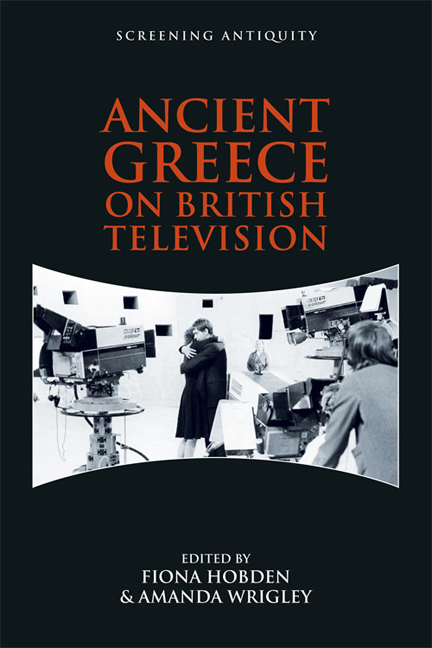Book contents
- Frontmatter
- Contents
- List of Figures and Tables
- Series Editors’ Preface
- Acknowledgements
- Contributors
- Abbreviations
- Broadcasting Greece: An Introduction to Greek Antiquity on the Small Screen
- 1 Are We the Greeks? Understanding Antiquity and Ourselves in Television Documentaries
- 2 Louis MacNeice and ‘The Paragons of Hellas’: Ancient Greece as Radio Propaganda
- 3 The Beginnings of Civilisation: Television Travels to Greece with Mortimer Wheeler and Compton Mackenzie
- 4 Tragedy for Teens: Ancient Greek Tragedy on BBC and ITV Schools Television in the 1960s
- 5 The Serpent Son (1979): A Science Fiction Aesthetic?
- 6 Don Taylor, the ‘Old-Fashioned Populist’? The Theban Plays (1986) and Iphigenia at Aulis (1990): Production Choices and Audience Responses
- 7 The Odyssey in the ‘Broom Cupboard’: Ulysses 31 and Odysseus: The Greatest Hero of Them All on Children’s BBC, 1985–1986
- 8 Greek Myth in the Whoniverse
- 9 The Digital Aesthetic in ‘Atlantis: The Evidence’ (2010)
- 10 Greece in the Making: From Intention to Practicalities in Television Documentaries. A Conversation with Michael Scott and David Wilson
- Bibliography
- Index
6 - Don Taylor, the ‘Old-Fashioned Populist’? The Theban Plays (1986) and Iphigenia at Aulis (1990): Production Choices and Audience Responses
Published online by Cambridge University Press: 24 April 2021
- Frontmatter
- Contents
- List of Figures and Tables
- Series Editors’ Preface
- Acknowledgements
- Contributors
- Abbreviations
- Broadcasting Greece: An Introduction to Greek Antiquity on the Small Screen
- 1 Are We the Greeks? Understanding Antiquity and Ourselves in Television Documentaries
- 2 Louis MacNeice and ‘The Paragons of Hellas’: Ancient Greece as Radio Propaganda
- 3 The Beginnings of Civilisation: Television Travels to Greece with Mortimer Wheeler and Compton Mackenzie
- 4 Tragedy for Teens: Ancient Greek Tragedy on BBC and ITV Schools Television in the 1960s
- 5 The Serpent Son (1979): A Science Fiction Aesthetic?
- 6 Don Taylor, the ‘Old-Fashioned Populist’? The Theban Plays (1986) and Iphigenia at Aulis (1990): Production Choices and Audience Responses
- 7 The Odyssey in the ‘Broom Cupboard’: Ulysses 31 and Odysseus: The Greatest Hero of Them All on Children’s BBC, 1985–1986
- 8 Greek Myth in the Whoniverse
- 9 The Digital Aesthetic in ‘Atlantis: The Evidence’ (2010)
- 10 Greece in the Making: From Intention to Practicalities in Television Documentaries. A Conversation with Michael Scott and David Wilson
- Bibliography
- Index
Summary
On Saturday 21 July 1990, at 8.45pm, BBC2 screened Euripides’ Iphigenia at Aulis as the last in the fifth season of the anthology drama series ‘Theatre Night’. Immediately after the ‘TWO’ logo faded, a pillar of yellow flame flickered up the centre of the black screen, a gong sounded and the words ‘The War Plays of Euripides’ appeared in white font over the flame. That plural is the only thing remaining in the televisual record to indicate that director-translator Don Taylor had wanted Iphigenia to stand as the first in a series of three televised Euripidean plays (with The Women of Troy and Helen), standing as a parallel to his earlier production of three Sophoclean plays: Oedipus the King, Oedipus at Colonus and Antigone. These three had been broadcast as a stand-alone series under the title The Theban Plays over three nights of a single week in 1986. But the parallel ‘trilogy’ was never to be completed. Far from being a beginning, Iphigenia would turn out to be the last ‘Theatre Night’ (there was no sixth season), the last time Taylor worked for television, and the last British television broadcast of a production of Greek tragedy for almost twenty-five years.
Despite this irony, Taylor's Iphigenia made him the most prolific director of Greek tragedy on British television (with a total of four plays), and the only one to tackle the genre more than once; his wish to direct a second trilogy on television reflects his firm belief that the medium was ‘merely the latest extension of a dramatic tradition that reached more or less unbroken back to Aeschylus’. His significance for Classicists interested in the twentieth-century reception and dissemination of Greek tragedy is assured. His significance in the broader history of British television drama has been identified as lying in his eloquent protest against mainstream developments in the field: he represents a range of people and approaches ultimately left behind by those developments. Although most of his television oeuvre in fact consisted of material written for the medium, his productions of Greek tragedy can be seen as exemplary of his determination to make what he considered quality drama available to a mass audience, whatever their origins.
- Type
- Chapter
- Information
- Ancient Greece on British Television , pp. 123 - 146Publisher: Edinburgh University PressPrint publication year: 2018



